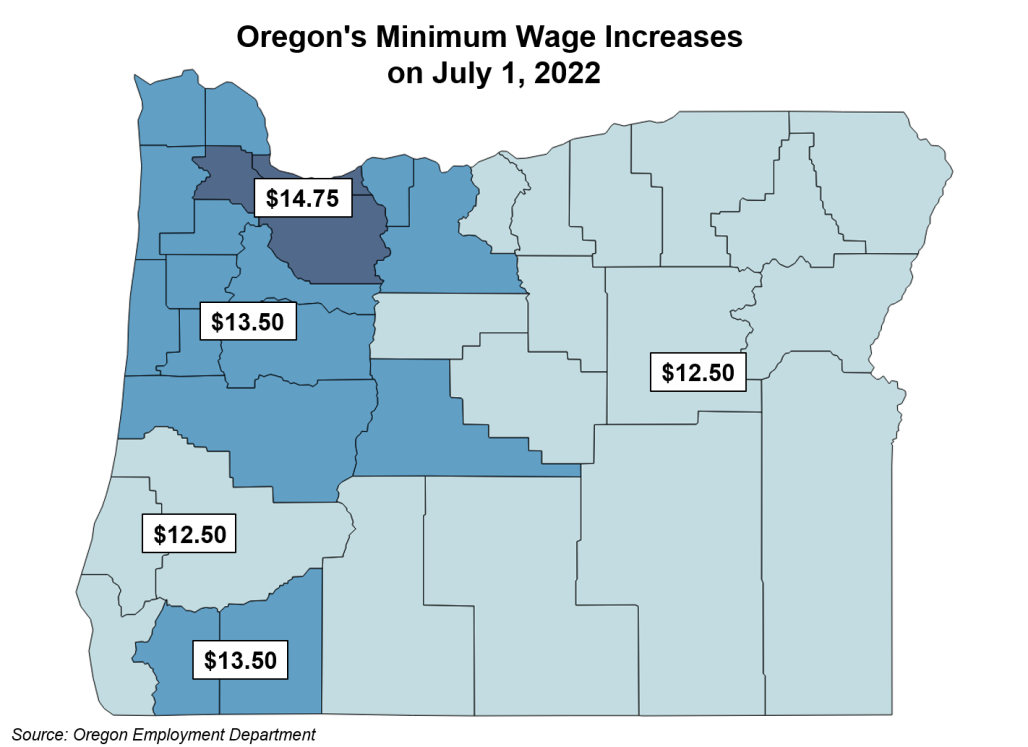What are the Labor Laws in Oregon?
Contents
- What are the Labor Laws in Oregon?
- Oregon Labor Law Breaks
- Minimum Wage
- Oregon Paid Leave
- Overtime
- Maternity Leave
- Nursing on the Job
- Working while under the age of eighteen
- Programs
- FAQ on Oregon Labor Laws
- How many hours straight can you legally work in Oregon?
- How many hours can you work without a break in Oregon?
- Is working 32 hours considered full-time in Oregon?
- Yes, if an employee is working seven or more consecutive hours, they must be given at least one 10-minute paid rest period.
- Can I skip my lunch break in Oregon?
- Can I sue my employer for not giving me breaks in Oregon?
- Does Oregon require PTO payout?
- How many hours can you legally work in a week in Oregon?
- Can my boss refuse to give me a break?
- Can a company deduct 30 minutes from your day if you don’t take a lunch?
- Can an employee refuse to take a break?
Companies based in the great state of Oregon must adhere to both federal labor laws and Oregon-specific labor regulations. The Oregon labor code provides comprehensive coverage of many employment-related issues, like discrimination, wages, leaves of absence, break periods, workplace safety, and payroll taxation. It is essential for organizations to be well-versed in the legal requirements they are held accountable for, as failure to do so could result in costly penalties or legal complications. By keeping up with the ever-evolving body of state and federal laws, employers can ensure that their operations remain compliant.
The Oregon Bureau of Labor and Industries, or BOLI, governs all labor laws in the state. BOLI works to protect the rights of workers, ensure non-discriminatory treatment and enforce compliance with state laws relating to wages, hours, and conditions of employment. They also spend time educating and training employers about wages, hours, and civil rights laws.
Oregon Labor Law Breaks
In Oregon, every employee must be given 1-1/2 hour meal breaks, free from all work obligations, for every 6- to 8-hour shift. For work spans of 7 hours or less, the meal break should occur between the second and fifth hour, and for longer work periods, it should occur between the third and sixth hour.
Where the employer can demonstrate that such a paid meal interval is standard practice or practice of the industry, a break period of less than half an hour but not less than 20 minutes is permitted, with compensation and relief from all tasks.
A meal break with compensation while on duty must be permitted for each 6- to 8-hour work period unless the employer can demonstrate that the nature of the employment forbids relief from all duties.
A rest period must be taken apart from the customary mealtime and in addition to it. It cannot be taken away from the beginning or end of a work session to shorten the overall length of the workday or add to the customary meal break.
When the employer can demonstrate that the employee has actually got the allotted time, that is adequate proof of compliance in the absence of regularly planned rest breaks. Only where the employer can demonstrate that the regular nature of the employment prohibits the employer from establishing and keeping a regularly planned rest period is this allowed?
Employees who work alone in a retail or service establishment that caters to the general public, age 18 and older, and who put in less than 5 hours over the course of a 16-hour period, are exempt from the requirement for a rest interval.
Minimum Wage
The minimum wage in Oregon as of July 1st, 2024 is $14.20; Portland Metro area: $15.45, non-urban $13.20This wage will be in effect until December 31st, 2024. Oregon law requires the minimum wage to be adjusted annually to account for inflation. This adjustment will differ from year to year and will be announced by September 30th.

Oregon Paid Leave
Starting January 1, 2023, Paid Leave Oregon requires all eligible employers in Oregon to make deductions from employee wages each pay period. These funds are remitted to the Oregon Department of Revenue (DOR) quarterly, with employers responsible for accurate reporting of total employee count and wages via Frances Online. Employees can apply for paid leave benefits through the Paid Leave Oregon website from September 3, 2023.
Paid Leave does not replace existing sick time or leave programs like OFLA, FMLA, or Oregon Sick Time; instead, it works concurrently with these programs if the employer meets eligibility criteria. The total contribution rate is 1% of an employee’s gross earnings per pay period, with employees themselves responsible for 60%, and larger employers (25 employees or more) required to cover the remaining 40%. In certain pregnancy-related scenarios, up to 14 weeks of paid leave may be taken during the year.
With Paid Leave Oregon, employees working in any sized business throughout Oregon are eligible to receive up to 12 weeks of paid leave a year, provided they have earned at least $1,000 in the prior calendar year. This provides invaluable security and assurance to employees that their livelihoods will be protected when they need it most.
Overtime
Any hours worked in excess of forty in a given week must be paid at one and a half times the employee’s regular rate. No matter what your employer tells you payment of overtime is required by law and cannot be waived through any sort of agreement. Time off in lieu of overtime pay must be taken in the same work week.
Some employees are exempt from overtime regulations because of the nature of their position. This list includes salespeople, mechanics, truck drivers, seamen, and workers in the motion picture industry. For a full list of exemptions, or to determine if you are exempt contact an attorney or the Oregon Bureau of Labor and Industries.
Maternity Leave
The Oregon Family Leave Act deals with maternity leave and other types of leave involving family issues.
There is no law that requires an employer to pay for time off before or after childbirth. The law is in place to protect your job during the time you are away. An eligible female employee can take up to thirty-six weeks of leave for childbirth. However, this must be taken under three separate twelve-week classifications that you must qualify for. They are pregnancy disability leave, parental leave, and sick child leave. This leave can be taken before, during, or after childbirth in any proportion. The only stipulation is that the thirty-six weeks must be taken within a twelve-month period.
Nursing on the Job
Something you may not know? Upon returning to work after giving birth employers with twenty-five or more employees are required to give all Mothers who are breastfeeding a child 18 months or younger unpaid rest periods of at least thirty minutes for every four hours worked.
Working while under the age of eighteen
Individuals as young as fourteen can be employed in Oregon, but under more strict guidelines. Each underage employee does not require a permit (the employer’s permit covers all underage employees for his/her business). All laws covering wages, overtime, and any other basic employee rights apply to employees under the age of eighteen.
Some of the restrictions that apply to underage employees include guidelines on the number of hours a person under the age of 16 can work and an expanded break schedule.
Programs
BOLI runs programs designed to field a highly skilled, competitive workforce. This includes many different types of apprenticeships. To learn more about these programs or to apply, contact your local office of the Oregon Bureau of Labor and Industries.
FAQ on Oregon Labor Laws
How many hours straight can you legally work in Oregon?
Employees are not allowed to work more than 10 hours per day or 50 hours per week unless otherwise stated in a union contract or employment agreement (Oregon law requires employers to pay at least time and a half for any work beyond 40 hours).
How many hours can you work without a break in Oregon?
Employees must be given at least a 30-minute unpaid meal period if they work six or more hours continuously. If an employee works seven or more consecutive hours employees must also be given a 10-minute paid rest period.
Is working 32 hours considered full-time in Oregon?
Yes, working 32 hours per week is typically considered full-time employment in Oregon.
Are 10-minute breaks mandatory in Oregon?
Yes, if an employee is working seven or more consecutive hours, they must be given at least one 10-minute paid rest period.
Can I skip my lunch break in Oregon?
No, while it is possible for employees to waive their right to a meal period, employers must still provide one if requested by an employee.
Can I sue my employer for not giving me breaks in Oregon?
Yes. Employers who fail to provide their employees with their legally mandated breaks may be subject to legal action from the state of Oregon.
Does Oregon require PTO payout?
Under state law, employers are not required to pay out accrued vacation time upon termination of employment; however, certain employers may have separate policies that mandate having such payouts. Be sure to check with your employer for details.
How many hours can you legally work in a week in Oregon?
Generally, employees are not allowed to work more than 10 hours per day or 50 hours per week unless otherwise stated in a union contract or employment agreement (Oregon law requires employers to pay at least time and a half for any work beyond 40 hours).
Can my boss refuse to give me a break?
Employers must provide the mandated meal periods and rest periods even if the employee opts not to take them. Refusing to do so may be considered a violation of labor laws.
Can a company deduct 30 minutes from your day if you don’t take a lunch?
No, employers are not permitted to deduct time from an employee’s workday when they do not take a meal period.
Can an employee refuse to take a break?
While an employee has the right to waive their right to take a meal period or rest period, employers must still provide them with the opportunity to take one if requested.

